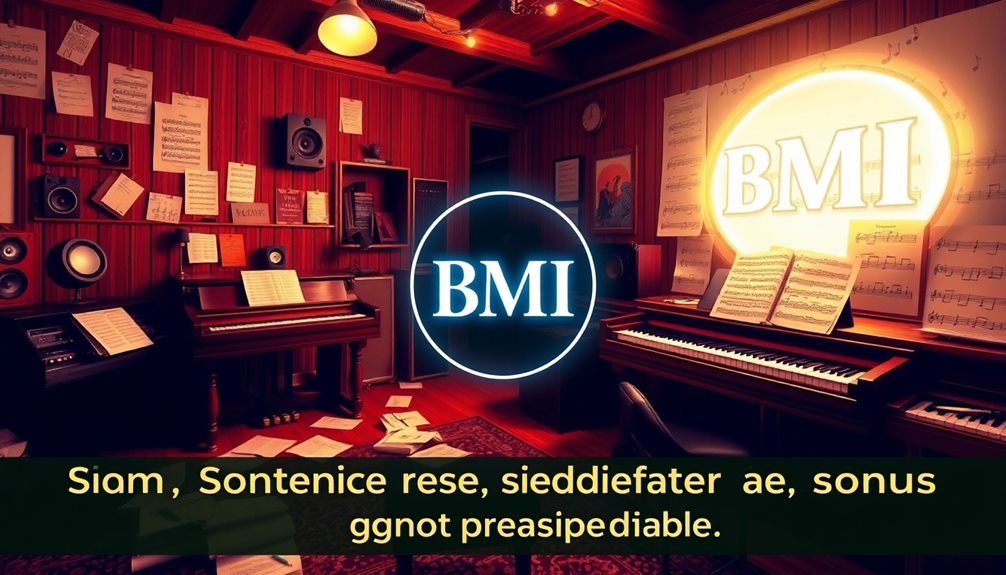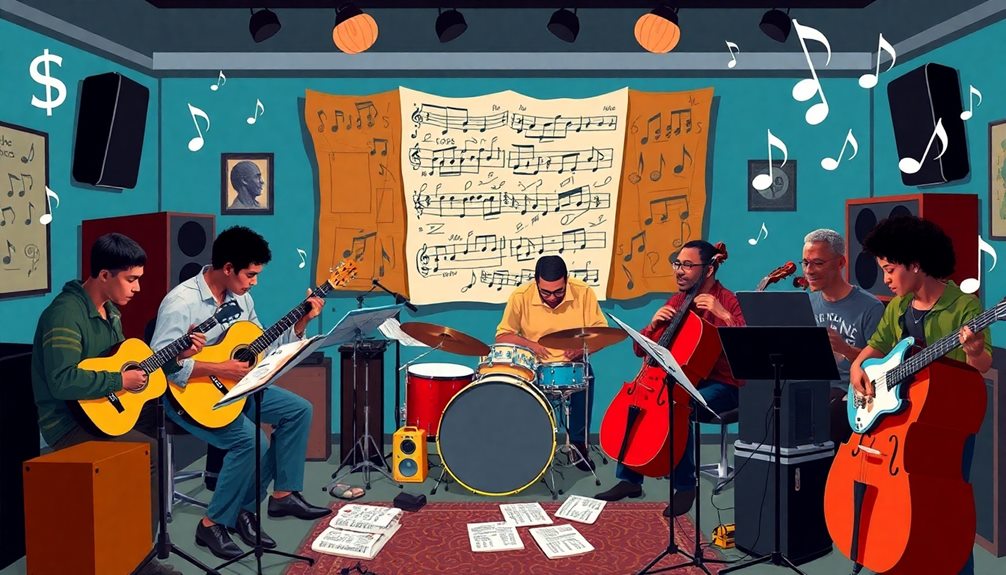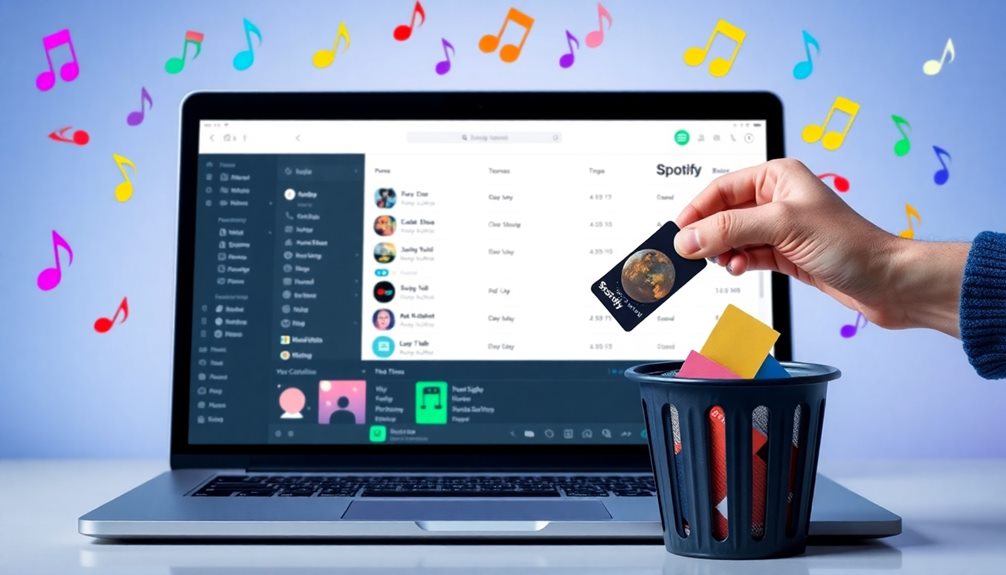BMI stands for Broadcast Music, Inc., and it's super important in the music industry! Founded in 1939, BMI helps songwriters and composers just like you by collecting and distributing royalties for your music. They manage millions of songs and guarantee you get paid when your music is played in public. BMI collects different types of royalties, like performing rights and mechanical royalties. They're all about making sure you can earn money from your hard work and creativity. Exciting, right? If you want to find out more about how BMI supports musicians and their royalties, keep going!
Key Takeaways
- BMI stands for Broadcast Music, Inc., a performing rights organization founded in 1939 to support music creators and collect royalties.
- It manages over 22.4 million musical works, generating significant revenue and distributing royalties to songwriters and publishers.
- BMI collects performing rights royalties when music is played publicly, and registration is necessary to receive these payments.
- The organization also facilitates foreign performance royalties through agreements with international copyright societies, although collection may take 12 to 18 months.
- BMI hosts annual awards to celebrate top-performed songs and supports music education initiatives for aspiring musicians.
Overview of BMI
Broadcast Music, Inc. (BMI) is a key player in the music industry, founded in 1939 and now representing over 1 million songwriters, composers, and music publishers. As a performing rights organization, BMI helps music creators earn money by collecting royalties. When you hear your favorite songs on the radio or at a concert, BMI makes sure the talented songwriters behind those tunes get paid!
BMI manages a huge collection of over 22.4 million musical works. That's a lot of songs! In fiscal year 2022, BMI brought in a whopping $1.573 billion in revenue. They distributed $1.471 billion in royalties to songwriters and music publishers. This means that when you enjoy music, BMI is hard at work behind the scenes, ensuring fair pay for the creators.
BMI also advocates for music rights. They work with other organizations to support the music community. Plus, they host annual award shows to celebrate top songs in their catalog.
History of BMI

Founded in 1939, BMI emerged as a response to the growing challenges posed by ASCAP's licensing fees, making music rights more accessible for broadcasters and businesses. This was a big deal for many!
In the 1940s and 1950s, BMI gained popularity, especially among radio stations. It represented music genres like blues, jazz, and country that were often overlooked. This helped many artists get the recognition they deserved.
In 1941, BMI entered into a consent decree with the Department of Justice. This was important because it required BMI to change some of its business practices to guarantee fair competition in the music rights industry.
Fast forward to 1979, and BMI found itself in the spotlight again with the landmark case, Broadcast Music, Inc. v. CBS, Inc. This case tackled important issues about performance rights and antitrust laws.
Over the years, BMI has shown it can adapt to changes in the music industry. It embraced technology and now represents over 22.4 million musical works.
This history highlights BMI's commitment to copyright owners and its role in shaping how royalties are distributed today. It's a fascinating journey that continues to impact the music world!
Types of Royalties

Now that you know a bit about BMI's history, let's explore the different types of royalties they handle!
You'll discover how performing rights royalties reward songwriters when their music is played, while sync licensing royalties kick in when tunes are used in TV shows and games.
Plus, we'll touch on mechanical royalties, which BMI doesn't collect, but are still important in the music world.
Performing Rights Royalties
When it comes to music, understanding the types of performing rights royalties is essential for songwriters and artists alike. Performing rights royalties are the payments you earn when your music is played in public. This includes live concerts, radio broadcasts, and even when your songs are featured in TV shows, commercials, or video games.
BMI collects these performance royalties to guarantee you get paid for your hard work!
It's important to know that streaming services like Spotify and Apple Music also contribute to these royalties. When your music is streamed, BMI collects money for you, too!
The cool part? Royalties are divided equally—50% goes to you, the songwriter, and 50% goes to your publisher or copyright holder.
To start earning those performance royalties, you must register with a PRO, like BMI. If you don't register your songs, you won't get any payments!
So, make certain to keep your music registered. By understanding performing rights, you can enjoy the rewards of your creativity and share your passion with the world.
Happy creating!
Mechanical Royalties Overview
While performance royalties guarantee you get paid when your music is played publicly, mechanical royalties focus on the reproduction of your songs. These royalties come from selling physical formats like CDs and vinyl, and even from digital downloads. It's essential to recognize that these royalties are different from performance royalties that BMI represents.
Here's a quick overview of how mechanical royalties work:
| Type of Mechanical Royalty | Description |
|---|---|
| Physical Sales | Earned from CDs and vinyl sold. |
| Digital Downloads | Earned when your songs are downloaded. |
| Streaming | Generated from music streamed online. |
| Licensing | Collected when others use your songs. |
Mechanical royalties are typically collected by the Harry Fox Agency (HFA) in the U.S. They handle the licensing for you. To receive these royalties, you must register your songs with HFA or similar organizations. If you don't, you might miss out on royalties from digital sales and more. So, make sure your works are registered! This way, you can enjoy the fruits of your creativity with every copy sold.
Sync Licensing Royalties
Generating revenue through sync licensing royalties offers artists and songwriters an exciting opportunity to monetize their music in visual media like films, TV shows, commercials, and video games. When your song is featured, you earn money!
Additionally, understanding reducing cart abandonment can provide valuable insights into how artists can better manage their music sales online. But remember, BMI doesn't directly collect these sync licensing fees. Instead, that job usually goes to the Harry Fox Agency, which helps music publishers with licensing.
The amount you can earn from sync licensing varies. It depends on how prominently your music is used, the production budget, and the terms of the licensing agreement. So, it's important to keep this in mind!
To guarantee you receive performance royalties from public performances, including those sync placements, you must register your works with BMI. This works registration helps track your music and makes it easier to collect those hard-earned royalties. If you don't register or communicate well with BMI, you might miss out on opportunities to get paid.
Sync licensing royalties can be a fantastic way to boost your income as an artist. So, get your music registered, and let's get your songs out there!
Royalty Distribution Process

The royalty distribution process at BMI is designed to guarantee fairness and transparency for songwriters and publishers alike. When BMI collects royalties, they make certain that both parties receive their fair share. They follow a straightforward 50/50 split for performance royalties, making sure everyone gets what they deserve.
Here's how it works:
- BMI retains about 12% for operational costs.
- Songwriters and publishers together receive 88% of the collected royalties.
- Payments are made quarterly, with minimums based on your payment method.
To collect royalties that BMI owes you, accurate registration of your songs is essential. This registration helps BMI track when and where your music gets played.
They use advanced technology to monitor performances across many platforms, making certain they can accurately determine the royalties owed to you.
Song Registration Importance

Registering your songs with BMI is essential for ensuring you receive the performance royalties you deserve. When you register, you protect your work and open the door to earning money from public performances. That's right! Every time your song is played live, on the radio, or even in a restaurant, you could earn royalties, but only if your song is registered.
The song registration importance can't be overstated. Without registering, you might miss out on valuable royalty opportunities. Imagine performing your heart out, only to find out later that you didn't register your song. That would be disappointing! Early registration helps you avoid this problem and makes sure you get paid.
BMI keeps an eye on how often your songs are played, so timely registration is key for collecting those performance royalties. Plus, if you want to take part in the BMI Live program, you must register your songs. This program lets you report your performances and receive even more compensation.
Also, registering helps you benefit from agreements with international PROs, allowing you to collect foreign performance royalties. So, don't wait—register your songs today!
Payment Methods and Timing

When it comes to receiving your hard-earned royalties, understanding BMI's payment methods and timing is essential.
BMI offers a few convenient ways for you to get your royalty payments. You can choose direct deposit, which is super fast and helps you avoid the wait for paper checks. That's right! You get your money quicker!
Here's what you need to know about the payment methods and timing:
- Royalties are distributed quarterly, so mark your calendar!
- For direct deposit, there's a minimum payment threshold of $2, while checks and wire transfers have varying thresholds.
- You can check upcoming payment dates and royalty reports anytime through your Online Services account.
Foreign Royalties Collection

As you explore your royalty payments, it's important to understand how foreign royalties are collected. When your music is played in other countries, performance royalties are generated. BMI collects these foreign royalties through special agreements called reciprocal agreements with international copyright societies. These societies keep an eye on how often your music is performed in their areas.
The collection process can take quite some time, usually between 12 to 18 months, depending on the country and the society's schedule for distributing money. Once these royalties are gathered, they're sent to BMI. After that, BMI pays you your share, ensuring that everything is tracked and collected properly.
If you want to check on your foreign royalties, just reach out to BMI. You can email them at statement@bmi.com with details like the country and the dates when your music was performed.
Keep in mind, though, that if the royalties from a performance are less than $50, foreign societies mightn't adjust those amounts. This could impact what you ultimately receive. So, stay informed and keep making great music!
Collection Delays Explained

When it comes to collecting foreign royalties, you might notice some delays, and that's totally normal!
These delays can happen for various reasons, like different systems used by international societies or longer timelines for payments.
Understanding how this process works will help you manage your expectations and keep your spirits high while waiting for those earnings!
Foreign Royalties Collection Process
Steering through the foreign royalties collection process can be complex, especially with factors that may lead to delays. When you perform abroad, you earn foreign performance royalties, but collecting them isn't always instant.
BMI has reciprocal agreements with international copyright societies, which helps streamline the collection process. However, the timeline can stretch from 12 to 18 months, depending on the country.
Here's what you should know about the process:
- BMI collects royalties from partner societies.
- They distribute payments based on performance data.
- Different societies may use varied methods to track performances.
This means that while BMI is working hard to gather and distribute your royalties, the collection process mightn't be quick.
If you have questions about your foreign royalties, don't hesitate to reach out to BMI. Providing detailed performance information can help resolve any collection issues faster.
Understanding these steps can make the waiting game a bit easier. You've put in the effort, and those royalties will come your way eventually, thanks to BMI's dedication to supporting its members!
Common Delay Reasons
Collecting foreign performance royalties involves maneuvering various challenges that can lead to delays. When you perform internationally, it can take a long time—sometimes 12 to 18 months—to see your money. This is because BMI works with different copyright societies around the world, and each has its own way of handling royalty distribution. Depending on their schedules, you might wait 1 to 2 years for your earnings!
Sometimes, smaller payments can be tricky, too. If your royalty amount is less than $50, many foreign societies won't make adjustments, which can cause even more collection delays. That's right! You might be waiting a while for what seems like a small amount.
If you have questions about your foreign performance royalties, don't hesitate to reach out to BMI. Just provide them with details about your performances, like the country and date range, so they can help track your payments.
Understanding these common delay reasons can help you manage your expectations. While waiting can be tough, knowing what's causing the hold-up can make it a bit easier. Keep your chin up—your performance royalties are on the way!
Managing Payment Expectations
Understanding payment timelines can be essential for managing your expectations regarding foreign performance royalties. When it comes to receiving money from places like radio stations and streaming services, patience is key. It can take 12 to 18 months for BMI to process these royalties due to different timelines and methods used by international copyright societies.
Here are some important points to remember:
- Payments for foreign performances often arrive 1 to 2 years after the performance date.
- BMI works hard to identify received royalties quickly, but sometimes delays happen.
- Foreign societies usually don't adjust royalties below $50, which might affect what you receive.
As a songwriter or publisher, knowing these timeframes can help you plan better. You can check your Online Services account for recent Distribution letters, which provide details like the country, date range, and involved radio stations.
This way, you can easily track your performance royalties and stay informed. Remember, staying aware of these timelines can make the waiting game a little easier, allowing you to focus on creating amazing music!
Awards and Recognitions

Awards and recognitions play an essential role in celebrating the achievements of songwriters and composers within BMI's expansive catalog. Every year, BMI hosts exciting award shows that honor the most-performed songs in its collection. These performances span a variety of genres, including Latin, Pop, Country, and more.
It's a fantastic way to showcase the incredible talent in BMI Music! Additionally, these events often emphasize themes of love and faith, similar to how short Jesus quotes inspire resilience and creativity.
The BMI Lehman Engel Musical Theatre Workshop is another shining star. This workshop has received prestigious awards, like the Tony Award and the Drama Desk Award. Notable alumni, such as Alan Menken and Robert Lopez, have made amazing contributions to musical theatre.
Their achievements inspire many aspiring composers. BMI also works with organizations like the Recording Academy to promote industry recognition. This collaboration helps support diversity and inclusion within the music community, making it a wonderful place for everyone.
Plus, the BMI Foundation is dedicated to music education and initiatives. It enhances BMI's commitment to recognizing and supporting musical talent.
With all these efforts, BMI not only celebrates achievements but also encourages the next generation of musicians to shine!
Related Organizations

BMI's impact on the music industry extends beyond its own initiatives, as it collaborates with various organizations to enhance the landscape for songwriters and composers. By teaming up with other groups, BMI helps guarantee that performance royalties are collected and distributed fairly. This teamwork is essential for protecting musical rights and supporting creators everywhere.
Here are some key organizations BMI works with:
- ASCAP (American Society of Composers, Authors, and Publishers): Another major PRO that focuses on the rights of songwriters and publishers.
- SESAC (Society of European Stage Authors and Composers): This organization also supports artists and helps them earn their performance royalties.
- CISAC (International Confederation of Societies of Authors and Composers): BMI's affiliation with CISAC helps with international royalty collections, ensuring artists are compensated globally.
Moreover, the BMI Foundation fosters new talent by providing scholarships and grants. They also partner with the Recording Academy to honor outstanding musical achievements at the Grammy Awards.
Together, these organizations create a brighter future for music creators, making sure their hard work is recognized and rewarded!
Frequently Asked Questions
Which Is Better, ASCAP or BMI?
Choosing between ASCAP and BMI depends on your needs. If you prefer faster payments and a higher royalty distribution percentage, BMI might suit you better. ASCAP, however, offers strong advocacy and a different payment structure.
What Percentage of Royalties Does BMI Take?
You might be surprised to learn that BMI retains about 12% of the total royalties collected. This means you'll receive 88% of your hard-earned performance royalties, ensuring fair compensation for your creativity.
How Much Does It Cost to Join BMI as a Songwriter?
Joining BMI as a songwriter is free, so you can register and start earning royalties without any upfront costs. Just remember to register your works to guarantee you receive your performance royalties efficiently.
How Does BMI Know When Your Song Is Played?
BMI knows when your song's played through technology and reports from music users. They monitor performances in real-time and require businesses to report playlists, ensuring accurate tracking and timely royalty collections for you.
Conclusion
In the world of music, BMI plays a big role in making sure artists get paid for their hard work. With a rich history and a variety of royalty types, it helps songwriters shine bright. Remember, registering your songs is like planting seeds for future success. Though collecting royalties can sometimes take longer than expected, it's all part of the journey. So, keep creating and dreaming, because your music deserves to be celebrated!









